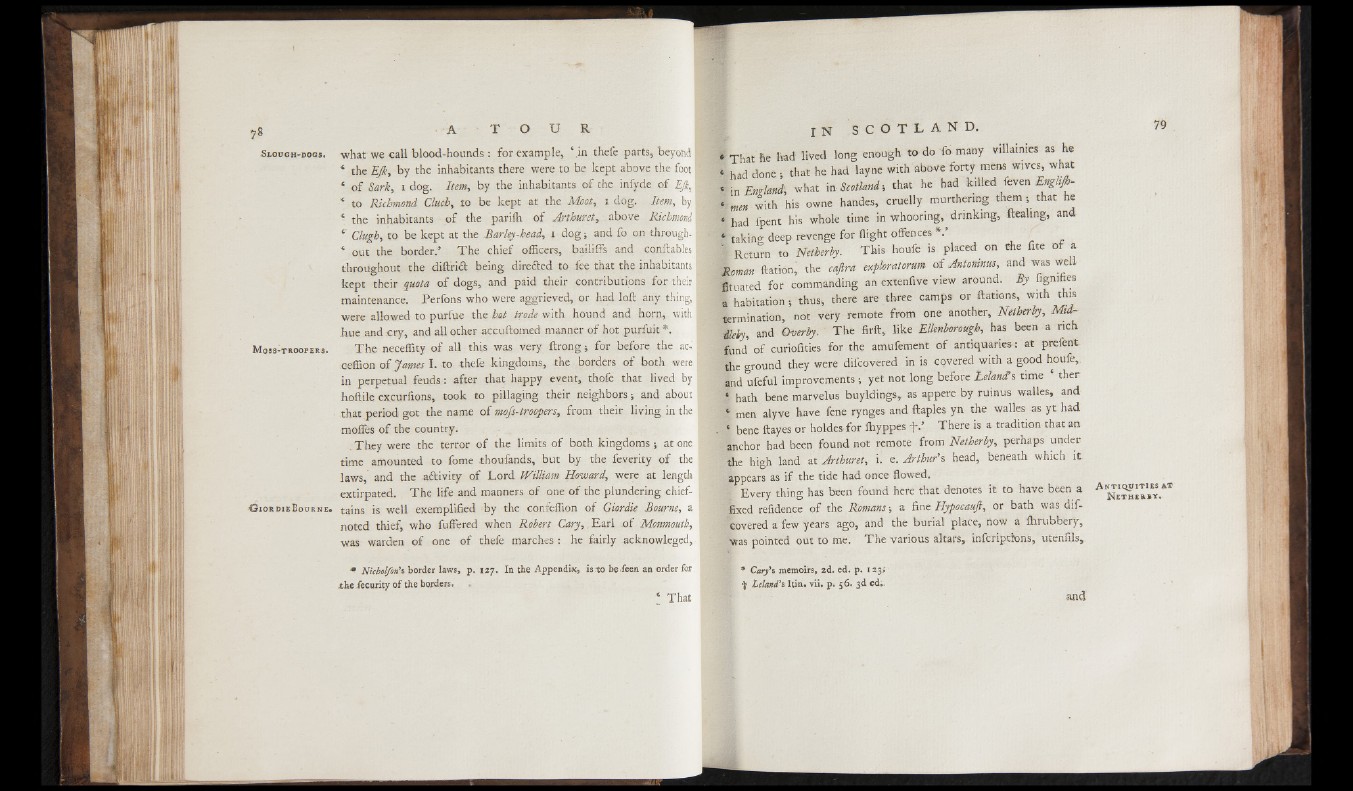
7 8
Slo ug h -dog s.
M oss- t r o o p e r s .
G io r d i e Bo u r n e #
what we call blood-hounds : for example, ‘ ,in thefe parts, beyond
* the EJk, by the inhabitants there were to be kept above the foot
‘ of Sark, i dog. Item, by the inhabitants of the infyde of EJk,
* to Richmond. Cluch, to be kept at the Moot, i dog. Item, by
‘ the inhabitants of the pariih of Arthuret, above Riehmotil
‘ Clugh, to be kept at the Barley-head, i dog j and fo on through.
\ out the border.’ The chief officers, bailiffs and conitables
throughout the diftridt being dire died to fee that the inhabitants
kept their quota o f dogs, and paid their contributions for their
maintenance. Perfons who were aggrieved, or had loft any thing,
were allowed to puriue the hat trade with hound and horn, with
hue and cry, and all other accuftomed manner of hot purfuit *.
The neceffity of all this was very ftrong, for before the ac*
ceffion of James I. to thefc kingdoms, the borders o f both were
in perpetual feuds: after that happy event, thofc that lived by
hoftile excurfions, took to pillaging their neighbors; and about
that period got the name of mofs-troopers, from their living in the
modes of the country.
They were the terror o f the limits o f both kingdoms; at one
time amounted to fome thoufands, but by the feverity of the
laws, and the adtivity of Lord William Howard, were at length
extirpated. The life and manners of one of the plundering chieftains
is well exemplified by the confeffion of Giordie Bourne, a
noted thief, who fufFered when Robert Cary,.Earl o f Monmouth,
was warden of one of thefe marches : he fairly acknowleged,
* Nicbol/in’s border laws, p. 127. In the Appendix, is to be feen an order for
the fecurity of the borders.
* That
* That Re had lived long enough to do fo many villainies as ht
4 had done; that he had layne with above forty mens wives, what
- in England-, what in Scotland, that he had killed feven E^lijh-
4 men with his owne handes, cruelly murthenng them ; that he
4 had i'pent his whole time in whooring, drinking, fteahng, and
4 "taking deep reveng e for flight offences * .
I Return to Netherby. This houfe is placed on the fite of a
koman ftation,'. the caftra exphratorum. of Antoninus, and was well
fituated for commanding an extenfive view around. By figmfies
a habitation; thus, there are three camps or ftations, with this
termination, not very remote from one another, Netherby, Mid-
dleky, and Overby. The firft, like Ellenborough, has been a rich
fund of curiofities for the amufement of antiquaries : at prefcnt
the ground they were difcovered in is covered with a good houfe,
and ufeful improvements; yet not long before Leland’s time 4 ther
4 hath bene marvelus buyldings, as appere by ruinus walles, and
‘ men alyve have fene rynges and ftaples yn the walles as yt had
. 4 bene ftayes or holdes for fhyppes There is a tradition that an
anchor had been found not remote from Netherby, perhaps under
the high land at Arthuret, i. e. Arthur’s, head, beneath which it
appears as if the tide had once flowed.
I f Every thing has been found here that denotes it to have been a
fixed reiidence o f the Romans *, a fine Hypocuufi, or bath was discovered
a £ew years ago, and the burial place, now a ihrtibbery,
Was pointed out to me. The various altars, infcriptions, utenfils*
* Cary's memoirs, 2d. ed. p. 1235
| j* Leland's Itin. vii. p. 56. jd. ed..
and
A n t i q u i t i e s a t
N e t h e r b y »